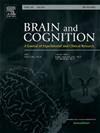与年龄相关的神经完整性差异与前瞻记忆的年龄效应无关
IF 1.4
3区 心理学
Q3 NEUROSCIENCES
引用次数: 0
摘要
前瞻记忆是指对未来意图的记忆。一般来说,在实验室环境中进行测试时,前瞻记忆似乎随着年龄的增长而下降,但在日常生活中需要完成任务时,前瞻记忆会得到保留或增强。到目前为止,还没有研究测试过两种情况下,特定大脑结构和网络的年龄相关差异是否会介导前瞻记忆的年龄效应。在这里,测量了41名年轻人和41名老年人的区域脑容量(前额叶前部皮层、额顶叶网络和颞叶)、白质完整性(前额叶白质低密度)和前瞻性记忆。结果表明,正如预期的那样,年龄越大,脑区域容量越小,前额叶白质完整性越差。此外,在实验室评估中,年龄与前瞻记忆功能呈负相关,但与日常生活中完成的任务表现呈正相关。然而,这些行为影响都不是由与年龄相关的神经完整性差异介导的。这些数据表明,与关注神经退行性疾病的文献相反,神经丧失已被证明可预测PM损伤,与年龄相关的脑完整性差异可能不是前瞻性记忆功能正常变化的最佳指标。本文章由计算机程序翻译,如有差异,请以英文原文为准。
Age-related differences in neural integrity are unrelated to prospective memory age effects
Prospective memory refers to memory for future intentions. In general, prospective memory appears to decline with age when tested in laboratory settings but is preserved or enhanced when tasks need to be completed in daily life. No study to date has tested whether age-related differences in specific brain structures and networks mediate prospective memory age effects in both settings. Here, measures of regional brain volume (anterior prefrontal cortex, frontoparietal networks, and temporal lobes), white matter integrity (prefrontal white matter hypointensities) and prospective memory were obtained from 41 younger and 41 older adults. The results showed that, as expected, older age was associated with smaller regional brain volumes, as well as poorer prefrontal white matter integrity. In addition, age was negatively associated with prospective memory function in the laboratory-based assessment, but positively associated with performance on the task completed in daily life. However, none of these behavioural effects were mediated by age-related differences in neural integrity. These data show that, in contrast to literature focused on neurodegenerative disease in which neural losses have been shown to be predictive of PM impairment, age-related differences in brain integrity may not be the best indicator of normal variation in prospective memory function.
求助全文
通过发布文献求助,成功后即可免费获取论文全文。
去求助
来源期刊

Brain and Cognition
医学-神经科学
CiteScore
4.60
自引率
0.00%
发文量
46
审稿时长
6 months
期刊介绍:
Brain and Cognition is a forum for the integration of the neurosciences and cognitive sciences. B&C publishes peer-reviewed research articles, theoretical papers, case histories that address important theoretical issues, and historical articles into the interaction between cognitive function and brain processes. The focus is on rigorous studies of an empirical or theoretical nature and which make an original contribution to our knowledge about the involvement of the nervous system in cognition. Coverage includes, but is not limited to memory, learning, emotion, perception, movement, music or praxis in relationship to brain structure or function. Published articles will typically address issues relating some aspect of cognitive function to its neurological substrates with clear theoretical import, formulating new hypotheses or refuting previously established hypotheses. Clinical papers are welcome if they raise issues of theoretical importance or concern and shed light on the interaction between brain function and cognitive function. We welcome review articles that clearly contribute a new perspective or integration, beyond summarizing the literature in the field; authors of review articles should make explicit where the contribution lies. We also welcome proposals for special issues on aspects of the relation between cognition and the structure and function of the nervous system. Such proposals can be made directly to the Editor-in-Chief from individuals interested in being guest editors for such collections.
 求助内容:
求助内容: 应助结果提醒方式:
应助结果提醒方式:


